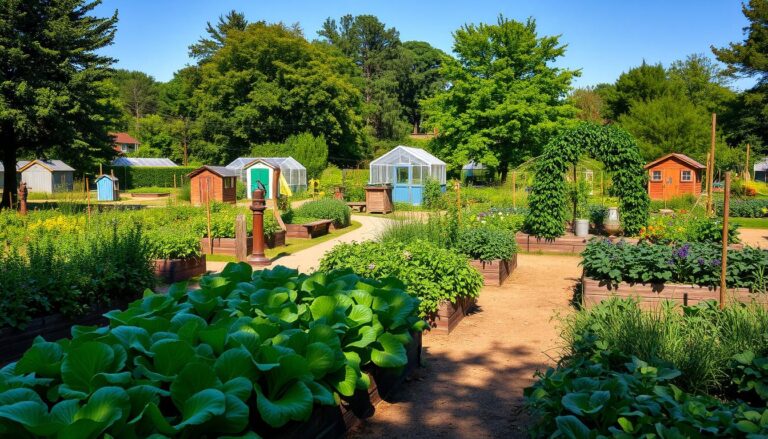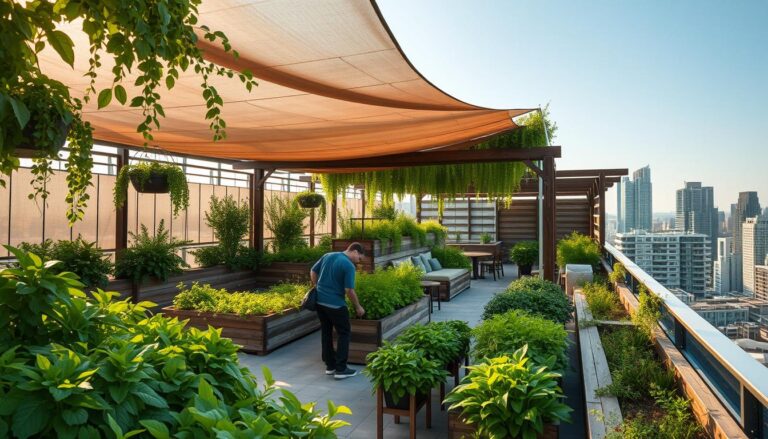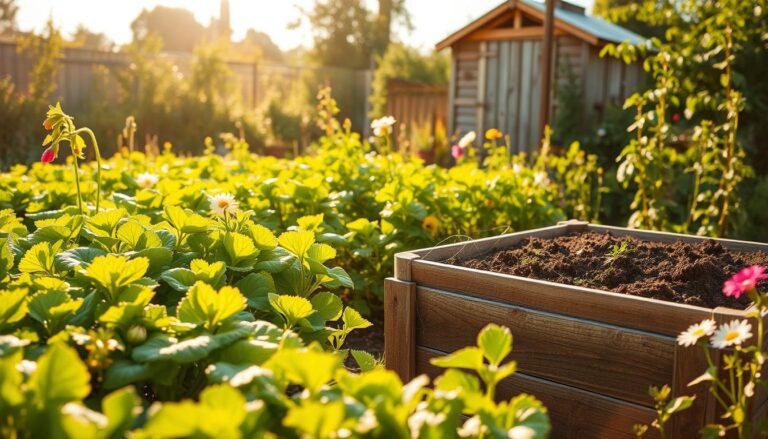Creating a thriving garden is a rewarding experience. By using eco-friendly gardening tips, you can make a lush oasis. This oasis beautifies your surroundings and helps the environment.
Using sustainable practices in your garden is key. It cuts down your carbon footprint and boosts biodiversity. With the right organic gardening techniques, you can enjoy a rich harvest. This keeps your soil and ecosystem healthy.
Starting this journey brings joy. You’ll learn to care for your garden deeply. This not only beautifies your space but also helps the planet.
The Foundations of Organic Gardening
Starting an eco-friendly garden means learning about organic gardening basics. Organic gardening is a way to work with nature to create a balanced garden. It’s not just about avoiding chemicals; it’s about improving soil health, increasing biodiversity, and using water wisely.
Understanding Organic Principles
Organic gardening is all about soil, plant, and environment health. It uses natural gardening methods to avoid synthetic fertilizers and pesticides. This protects the ecosystem and supports sustainable gardening practices.
Benefits of Chemical-Free Growing
Chemical-free gardening is good for the environment and makes your garden’s produce better. It keeps soil, water, and plants safe from harmful chemicals. This method also helps create a healthier garden by supporting good insects and microorganisms.
Getting Started with Organic Methods
To start organic gardening, first check your soil type and condition. Then, pick the right plants for your climate and soil. Using sustainable gardening practices like composting and mulching will help your garden grow strong and green.
By following these basic principles, you’ll create a lively, organic garden. It will not only benefit you but also help make the planet healthier.
Essential Organic Gardening Techniques for Success
To succeed in organic gardening, you need to learn a few key techniques. These will help you grow a healthy, eco-friendly garden. It’s not just about avoiding chemicals. It’s about creating a balanced ecosystem for your plants.
This means planning well, understanding seasonal changes, and using the right tools.
Planning Your Organic Garden
Planning is key in organic gardening. You need to decide what to grow, where, and how to handle challenges. Companion planting is a great technique. It involves growing different plants together to improve growth and flavor.
Good planning also includes crop rotation and succession planting. These methods keep the soil healthy and increase yields. A well-planned garden needs less external help like fertilizers and pesticides. It also becomes more resilient and diverse.
Seasonal Considerations
Understanding seasonal changes is crucial for organic gardening. Each season brings its own challenges, like frost in winter or drought in summer. To adapt, choose the right plants for the season and prepare the soil accordingly.
“The garden is a love song, a duet between a human being and Mother Nature.” – Jeff Cox
Tools and Equipment for Organic Gardeners
The right tools and equipment can greatly improve your organic gardening experience. You’ll need a garden fork, hoe, and trowel for tasks like weeding and planting. The quality of these tools matters a lot.
| Tool | Use | Tips for Organic Gardening |
|---|---|---|
| Garden Fork | Turning over soil, mixing compost | Choose a fork with sturdy tines to handle tough soil |
| Hoe | Weeding, cultivating soil | Use a hoe with a sharp blade for effective weeding |
| Trowel | Planting seeds and seedlings | Select a trowel with a comfortable handle for ease of use |
By learning these essential techniques, you can create a vibrant, sustainable garden. It will benefit you and the environment.
Building Healthy Soil: The Foundation of Garden Vitality
Healthy soil is key to a lively and green garden. The quality of your soil affects your plants’ health and growth. So, learning to improve and keep soil healthy is vital for organic gardeners.
Soil Testing and Analysis
To better your soil, first, you must know its state. Soil testing is essential. It shows you what nutrients are lacking, the pH levels, and more. This info helps you choose the right amendments and changes.
Composting Fundamentals
Composting turns kitchen waste and yard trimmings into a soil booster. It’s a great way to recycle and make soil richer. You’ll need both “green” (like vegetable peels) and “brown” (like dried leaves) materials to start.
Natural Soil Amendments
Natural additives can greatly boost soil health. These include:
- Organic matter like compost and manure
- Mineral supplements such as lime and rock phosphate
Organic Matter Integration
Adding organic matter to your soil makes it better. It improves structure, holds more water, and feeds plants. You can mix compost into the soil or use it as mulch.
Mineral Supplements
Mineral supplements fix specific soil issues. Lime can make acidic soils less acidic. Rock phosphate is a natural phosphorus source.
| Soil Amendment | Purpose | Benefits |
|---|---|---|
| Compost | Improves soil structure and fertility | Enhances nutrient content, supports beneficial microbes |
| Lime | Adjusts soil pH | Reduces acidity, improves nutrient availability |
| Rock Phosphate | Provides phosphorus | Promotes root development, enhances flowering |
Using these soil health improvement techniques and natural gardening methods will make your garden flourish and last.
Natural Pest and Disease Management
Effective organic gardening means knowing how to manage pests and diseases naturally. A healthy garden isn’t pest-free. It’s where the ecosystem is balanced.
Preventive Measures for Garden Health
Prevention is crucial in organic gardening. Crop rotation and proper spacing help prevent disease. Also, check your plants often and remove any diseased parts to stop the spread.
Beneficial Insects and Biodiversity
Beneficial insects like ladybugs and lacewings eat common pests. Planting different flowers and herbs attracts these helpful bugs. Gardening expert says, “Biodiversity is key for a strong garden ecosystem.”
“A diverse garden is a healthy garden, where pests are kept in check by natural predators.”
Organic Solutions for Common Garden Pests
Organic gardeners use homemade sprays and physical barriers to manage pests.
Homemade Organic Sprays
Garlic, neem oil, or soap sprays can keep pests away without harming good bugs.
Physical Barriers and Traps
Row covers or traps protect plants from pests. Copper tape, for example, keeps slugs away.
By using these methods, gardeners can keep their gardens healthy and thriving. They stay in harmony with nature.
Sustainable Practices for Eco-Friendly Gardens
Using sustainable practices helps your garden grow well and be kind to the planet. These green methods make your garden healthier for the environment.
Water Conservation Techniques
Water saving is vital in gardening. Drip irrigation and mulching cut down on water loss. They make sure plants get the right moisture. Also, using rain barrels for water is a great idea.
Companion Planting Strategies
Companion planting means growing plants together for better health. For instance, marigolds keep nematodes away from tomatoes. Basil keeps aphids off and makes tomatoes taste better. This way, you need less chemical pesticides.
Crop Rotation and Succession Planting
Crop rotation and succession planting keep the soil healthy. Rotating crops stops nutrient loss and pest problems. Succession planting means you always have something to harvest.
Mulching Methods for Soil Protection
Mulching is a great way to protect your soil. Organic mulch keeps moisture in, stops weeds, and controls soil temperature. As it breaks down, it adds nutrients to the soil.
By using these sustainable gardening practices, you can make a beautiful, eco-friendly garden. It’s good for the planet and for you.
Nurturing Your Organic Garden Journey
Starting an organic garden is a journey that helps your garden and the planet. By using the tips from this article, you’re making your garden greener. This is a big step towards a healthy, eco-friendly space.
Learning about organic gardening and using green practices is key. You’re working on soil health, controlling pests without chemicals, and saving water. This creates a garden that’s good for the environment and grows well.
Keep going on your organic gardening path. Every little thing you do helps. Try new things, watch your garden grow, and enjoy what you’ve worked for. With time, effort, and a focus on organic gardening, you’ll see your hard work pay off.
FAQ
What are the benefits of using organic gardening techniques?
How can I improve soil health in my organic garden?
What are some effective natural pest control strategies for organic gardening?
How can I conserve water in my organic garden?
What is companion planting, and how can it benefit my organic garden?
How can I maintain a balanced ecosystem in my organic garden?
What are some sustainable gardening practices I can adopt?

Sortemdia nasceu com o propósito de trazer alegria e oportunidades para todos por meio de sorteios gratuitos de prêmios incríveis. O site tem como missão oferecer experiências acessíveis, divertidas e justas para quem deseja concorrer a produtos, serviços e brindes sem pagar nada por isso. Acreditamos que a sorte pode bater à porta de qualquer pessoa — e no Sortemdia, ela pode chegar com apenas um clique.



